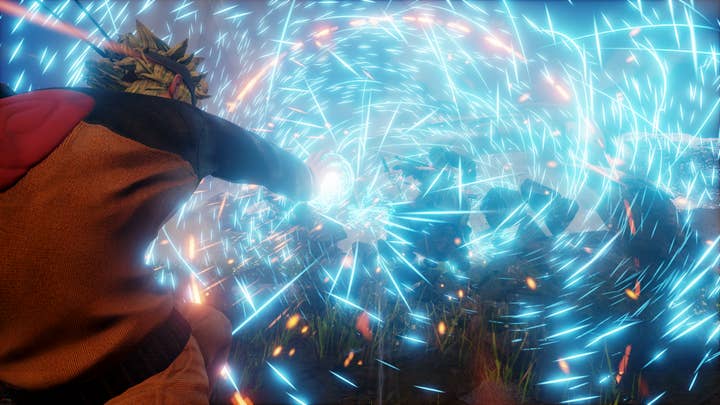Bandai Namco: “We want 50% of our games to be new IP”
Digital and marketing VP Hervé Hoerdt details how the Japanese publisher plans to create new brands that yield movies, toys and more
Most major publishers rely heavily on established franchises to drive their business. Granted, there is the occasional foray into new IP in the hopes of of establishing a new franchise, but by and large the bulk of their portfolio will be comprised of known brands with higher sales potential.
The same has been true thus far for Japanese entertainment firm Bandai Namco - a force to be reckoned with in its home market, but historically something of an underdog in the West. In fact, many of the franchises it brings to the games world aren't even its own, encompassing licensed properties such as Naruto, Dragon Ball Z and One Piece.
The publisher is determined to turn this around, and it believes that new and original properties will be the key. Its efforts can be seen in both its upcoming release slate, with the likes of Code Vein and 11-11: Memories Untold, and key launches from the past few years, including Little Nightmares and Get Even. Most tellingly, the company announced in its financials earlier this year that it had established a new IP creation unit to build new brands across all industries it operaties in.
Speaking with GamesIndustry.biz at E3 2018, European digital and marketing VP Hervé Hoerdt said this is no trivial effort - the publisher wants these fresh franchises to become a major part of its portfolio.
"We want 50 per cent of our business to come from new IPs," he says. "Why is this? First, it's to build a sustainable business because most of our IPs are franchises and licences. To be a sustainable business, you need to have your own IP; every publisher is building their own IP. The other thing is the IP we have are always reaching the same marketing segment, like fighting and anime, but there's much more to do in the video game market, much bigger genres.
"Last but not least, we're an entertainment company not just a video game company. We're looking to explore those IP in 360-degrees. This is not something we can do with a licensed franchise like Naruto. If you look at Naruto, One Piece, Dragon Ball Z, we're already a licensee. We want to create IP that we can explore in 360-degrees, like we're doing with Little Nightmares, for example. There are a lot of things to come from this IP, and it's no secret we're talking with people around the world to make a movie out of it. At some point there might be other opportunities like escape rooms, and stuff like that."
The publisher has also said it wants 50 per cent of its titles to be developed outside of Japan, recognising how heavily skewed its portfolio is towards its home market. Hoerdt stresses that neither object is likely to be met within the next three-to-five years, but believes it "should definitely happen within the next decade."
While the IP Creation unit will be central to this effort, Bandai Namco is not relying purely on internal creativity to diversify its games catalogue. Hoerdt tells us the business development team is "meeting more than 200 studios per year" to see if their current projects could be a good fit.

It's meetings such as this that led to Little Nightmares, Get Even and the newly announced Twin Mirror, a dark adventure game from Life is Strange developer Dontnod Entertainment. Again, the emphasis here is not just on releasing new titles but building new franchises that can be expanded beyond games; in fact, Bandai Namco owns this new property and is already drawing up potential plans for it.
"Dontnod is really a rising star," Hoerdt says. "We can see that from what they did early on with Remember Me and more recently with Vampyr.
"Most of our IPs are franchises and licences. To be a sustainable business, you need to have your own IP"
"We want to grow step-by-step. We're not the sort of company to put $50m on the table to buy IP - we're a Japanese company, so we're slowly but surely moving [forward]. The fact that we have a strategic fit with Dontnod - we are growing, they are growing, they've proven they have something very strong with Life Is Strange and again with Vampyr.
"Narrative, story-driven, emotional journeys are something we want to exploit. We will actually own this IP, so we hope to exploit this with a movie and so on. That's another reason why we wanted to do this."
This all ties into another strategy the publisher has discussed, a region-specific plan known as All Bandai Namco. It's not been overly clear what this entails, but when we ask Hoerdt, it sounds like the firm is simply trying to play to its strengths more than it has in the past.
"The strength of the company is that we're one of the biggest toy makers in the world," he explains. "In the UK, we have Namco Funscape and a lot of entertainment locations. There's another entity that does VR zone, then there are our video games and our arcade machines. The idea of All Bandai Namco is to leverage all the synergies we can.
"The consumer engages with an IP. If we can extend that experience in many different things, it would be better - both from a consumer perspective and from the company's. So the idea is to leverage all this, to break the silo. Japanese companies are really silo companies - that's not a secret. Any silo [we can break] is another way in which we can grow.
"[We have] a clear vision of our limits as a company and we're working on those limits. Every limit we push is turning into business and more consumers, which means more people engaged. It's not about money or business, it's about creating brands that people love and having more consumers around the world engage with them and experience them in 360-degrees."

The push for such partnerships also seems to be addressing another imbalance within Bandai Namco's portfolio. While the firm enjoys decent success with the likes of Ni No Kuni and the Tales series, these have a much stronger appeal in Japan. That's not to say the publisher is without its share of global hits; the Souls and Witcher games have proven to be best-sellers, but again this is not IP Bandai Namco has any control over.
"We're successful today as a company but we have bigger ambitions. Just to conquer a two per cent market share in other genres [would be great]"
When you look at the line-up of new IP the firm has released or announced in the last few years, much of it seems to be more targeted towards a Western audience. Little Nightmares is a Swedish-developed surreal platformer, Get Even is a UK-based thriller from a Polish developer, and Twin Mirror is set in a quiet West Virginian town. Is the focus on Western-facing IP deliberate?
"Yes, definitely," says Hoerdt. "With the Group content, through the decades we've come to know what consumers expect. We've created a business intelligence unit, we've done our market research, we've got a community team to listen to what consumers expect and feed that back into game development. We are not comfortable, because you never are in this fast-moving industry, but we know this."
He adds that these IP will also help bring Bandai Namco into a range of new genres: "We are the king of the fighting segment, but that's very small. We have RPGs, which is slightly bigger, but outside these there are lots of markets - platforming, sports, racing, action adventure - there are lots of possibilities for us. We're successful today as a company but we have bigger ambitions. Just to conquer a two per cent market share in those other markets [would be great]."
None of which is to say Bandai Namco is shying away from the genres and markets that have driven the company's success thus far. By far its biggest reveal at E3 2018 was Jump Force, which debuted on the Xbox stage - a prominent placement for any publisher. This anime mashup brawler is the latest Shonen Jump title and pits characters from Naruto, One Piece, Dragon Ball Z and more against each other.
Again, this is a licensed title and highlights some of the widely-known IP Bandai Namco helps to bring to market, but Hoerdt hopes the firm's new strategies will introduce more balance and perhaps boost some of the properties Bandai Namco already owns. The VP points at Square Enix as an example of what the company hopes to achieve, citing the Final Fantasy firm's mix of Japanese and Western IP as "something I envy, to be honest."
"Obviously, licensed games are the basis of our business but as a group, we own a lot of IP like Pac-Man, Tekken, Soul Calibur, Ace Combat - those also form a solid base for the business," he concludes. "Then we want to be on top with our new IP, and we have an Innovation Lab, which recently announced Pac-Man Stories for Alexa. That's an interesting project from an innovation prospect, mostly led by Lee Kirton on our UK team.
"We're still perceived as a company with lots of licensed titles, but with Little Nightmare, Twin Mirror and lots more to come, we hope to shift this fifty-fifty to something more balanced."








